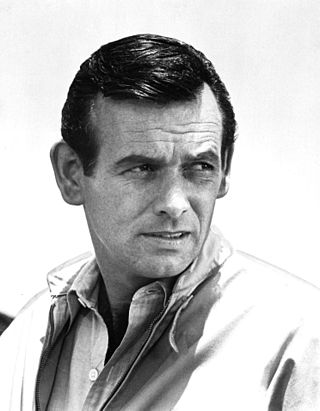
David Janssen was an American film and television actor who is best known for his starring role as Richard Kimble in the television series The Fugitive (1963–1967). Janssen also had the title roles in three other series: Richard Diamond, Private Detective; O'Hara, U.S. Treasury; and Harry O.

Odd Man Out is a 1947 British film noir directed by Carol Reed, and starring James Mason, Robert Newton, Cyril Cusack, and Kathleen Ryan. Set in Belfast, Northern Ireland, it follows a wounded Nationalist leader who attempts to evade police in the aftermath of a robbery. It is based on the 1945 novel of the same name by F. L. Green.

R-Point is a 2004 South Korean psychological horror war film written and directed by Kong Su-chang. Set in Vietnam in 1972, during the Vietnam War, it stars Kam Woo-sung and Son Byong-ho as members of the South Korean Army in Vietnam. Most of the movie was shot in Cambodia. Bokor Hill Station plays a prominent part of the movie, in this case doubling as a French colonial plantation. In 2011, Palisades Tartan re-released this film on DVD under the title Ghosts of War.
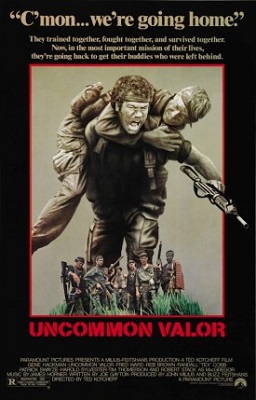
Uncommon Valor is a 1983 American action war film directed by Ted Kotcheff and starring: Gene Hackman, Fred Ward, Reb Brown, Randall "Tex" Cobb, Robert Stack, Patrick Swayze, Harold Sylvester and Tim Thomerson. Hackman plays a former U.S. Marine colonel, who puts together a rag-tag team to rescue his son, who he believes is among those still held in Laos after the Vietnam War.

On 19 March 1988, the British Army corporals Derek Wood and David Howes were killed by the Provisional IRA in Belfast, Northern Ireland, in what became known as the corporals killings.

Go Tell the Spartans is a 1978 American war film directed by Ted Post and starring Burt Lancaster. The film is based on Daniel Ford's 1967 novel Incident at Muc Wa about U.S. Army military advisors during the early part of the Vietnam War in 1964, when Ford was a correspondent in Vietnam for The Nation.

Tiger Beer is a Singaporean brand of beer first launched in 1932. It is currently produced by Heineken Asia Pacific, formerly known as Asia Pacific Breweries. The company is a joint venture between Heineken N.V. and Singaporean multinational food and beverage company Fraser and Neave.
"The Two and a Half Feathers" is the eighth episode of the fourth series of the British comedy series Dad's Army. It was originally transmitted on Friday 13 November 1970.

Platoon Leader is a 1988 war film set in the Vietnam War and directed by Aaron Norris ; it stars Michael Dudikoff and Michael DeLorenzo and was filmed in South Africa. It is loosely based on James R. McDonough's memoir of the same name.
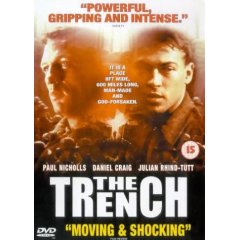
The Trench is a 1999 war film written and directed by William Boyd and starring Paul Nicholls and Daniel Craig. It depicts the experiences of a group of young British soldiers in the 48 hours leading up to the Battle of the Somme in 1916.
"Abyssinia, Henry" is the 72nd episode of the M*A*S*H television series and the final episode of the series' third season. It was written by Everett Greenbaum and Jim Fritzell, and it first aired on March 18, 1975. The episode is notable for its shocking ending, in which the unit's amiable commanding officer Lieutenant Colonel Henry Blake receives an honorable discharge and leaves for home but, in the final scene, is reported killed by enemy fire. This ending prompted more than 1,000 letters to series producers Gene Reynolds and Larry Gelbart, and drew fire from both CBS and 20th Century Fox.

"I Was Only 19" is a song by the Australian folk group Redgum. The song was released in March 1983 as a single, which hit number one on the national Kent Music Report Singles Chart for two weeks. It was also recorded for Redgum's live album Caught in the Act, released in June, which stayed in the top 40 of the Kent Music Report Albums Chart for four months. Royalties for the song go to the Vietnam Veterans Association of Australia. It is in the Australasian Performing Right Association's Top 30 Australian Songs of all time. "I Was Only 19" became the most widely recognised song by the band.

Brigadier Francis Philip "Ted" Serong, was a senior officer of the Australian Army. Born into a Roman Catholic family in 1915, Serong's opposition to communism led him to join the army, graduating from the Royal Military College, Duntroon, in 1937. During the Second World War he mainly served in training and staff roles, but saw combat against the Japanese at Wewak late in the war. In the post-war period he had a significant influence on the training of the Australian Army, which he helped re-orient to warfare in South East Asia, heading the jungle training centre at Canungra in 1955 and developing the army's counter-insurgency doctrine. He instructed the armed forces of Burma in jungle warfare in the late 1950s and was a strategic advisor to the Burmese Army from 1960 to 1962.

On the Fiddle is a 1961 British comedy film directed by Cyril Frankel and starring Sean Connery, Alfred Lynch, Cecil Parker, Stanley Holloway, Eric Barker, Mike Sarne, Wilfrid Hyde-White, Kathleen Harrison, Victor Maddern and John Le Mesurier. The screenplay was by Harold Buchman, based on the 1961 novel Stop at a Winner by R.F. Delderfield who served in the RAF in World War II.
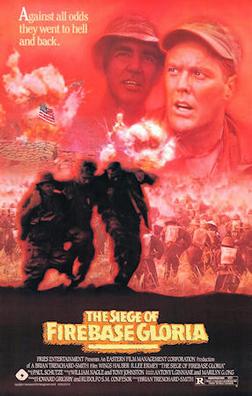
The Siege of Firebase Gloria is a 1989 Australian war film directed by Brian Trenchard-Smith, starring Wings Hauser and R. Lee Ermey. It was filmed in the Philippines.

The Deserter, also known as The S.O.B.s and The Devil's Backbone is a 1970 Italian-Yugoslav American international co-production Western film produced by Dino De Laurentiis. It was directed by Burt Kennedy and written by Clair Huffaker.
William Lawrence Nagle was an Australian soldier, author, actor, and screenwriter. His first book, The Odd Angry Shot, written after his return from the Vietnam War and exit from the army, traced the lives of a group of Australian soldiers from their departure from Australia, their rotation in South Vietnam, and return to Australia. The book was made into a movie of the same name released in 1979.

The Odd Angry Shot (1975) is a novel by Australian author William Nagle.
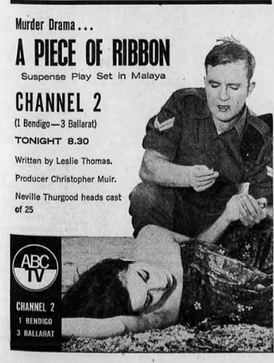
A Piece of Ribbon is a 1963 Australian television play filmed. It was based on an English TV play by Leslie Thomas that had already been performed by the BBC.

Danger Close: The Battle of Long Tan is a 2019 Australian war film about the Battle of Long Tan during the Vietnam War. It is directed by Kriv Stenders and stars Travis Fimmel.

















